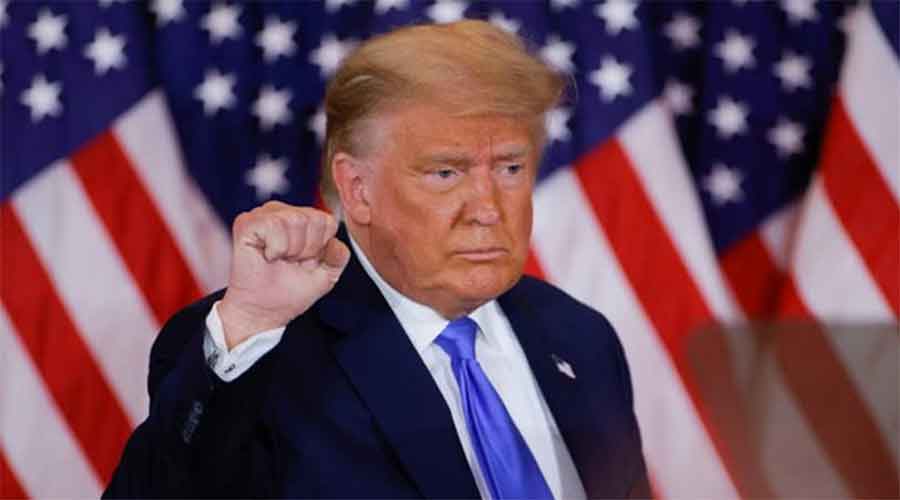Former President Donald J. Trump is expected to announce a third White House campaign soon after the midterms, possibly as soon as November 14, according to people familiar with the planning.
The potential announcement date was first reported by Axios.
On Thursday night, Trump opened a swing of four rallies in the final five days of the midterm elections in Iowa, where he was joined by Senator Chuck Grassley, an Iowa Republican seeking an eighth consecutive six-year term.
His Iowa stop highlighted both the power and the limitations of his political brand as he inches closer to announcing a third presidential campaign.
Even though he is not on the ballot this year and his stump speech is spent mostly rehashing old grievances and policies, Trump still drew thousands on a night when temperatures dipped to 4° Celsius.
But the fact that he was campaigning in this remote stretch of a state that remains far down the list of midterm battlegrounds was a reflection of Trump’s political baggage.
In the five states with toss-up Senate races, according to Cook Political Report, Trump has not held rallies in two — Georgia or Wisconsin — since the primary season ended. He’ll visit just one of those toss-up states, Pennsylvania, in his final four rallies. He’s scheduled to campaign in Florida and Ohio this weekend.
Still, Trump is preparing his supporters for a third consecutive presidential bid.
Wearing black gloves and a matching overcoat, Trump spoke at length about the possibility of his own potential campaign before bringing to the stage Grassley and governor Kim Reynolds, the two candidates he was in the state to promote.
“In order to make our country successful and safe and glorious, I will very, very, very probably do it again,” he said of another presidential bid. “Very, very, very, probably.” The crowd erupted in applause and chants of “Trump! Trump! Trump!”
“Get ready — that’s all I’m telling you,” Trump said. “Very soon.”
While Trump wants to be the future of the Republican Party, it was the prolonged past that took centre stage on Thursday night.
The most remarkable moment of his hour-long speech unfolded when Trump was joined on the Sioux Gateway Airport tarmac by Grassley to criticise President Biden and make a plea to vote against Democrats who control Congress.
It was a peculiar message from a 76-year-old former President — teamed up with an 89-year-old senator — to roast the 79-year-old Democrat in the White House.
Grassley blamed Biden for dividing the country. Trump, who earlier had faulted his successor for high inflation, marvelled at the energy from Grassley, who wore a green John Deere, an American agricultural company, hat for the event.
“You’re unbelievable,” Trump told the senator. “I’m looking at him in that beautiful green hat — he looks like he’s like 40 years old.”
Decision on charges
The justice department hopes to reach a decision on whether to bring charges against Trump before the 2024 campaign heats up, and is considering appointing a special counsel to oversee investigations of him if he runs again, according to people familiar with the situation.
The department is investigating Trump’s role in the efforts to reverse the outcome of the 2020 election and the January 6 attack on the US Capitol, and his retention of sensitive government documents at his residence and resort in Florida. It has made no decision in either case, but the inquiry into the former President’s handling of the documents is more straightforward, with prosecutors having publicly cited potential crimes that could be charged.
Senior department officials and veteran prosecutors with the department’s national security division, in conjunction with the US attorney’s office in South Florida, have spent recent weeks quietly navigating the thicket of thorny issues needed to file charges in the investigation of the documents, weighing evidence, analysing legal precedents and mulling practical considerations such as the venue of a possible trial.
The investigation, while proceeding quickly by justice department standards, has been slowed by Trump’s efforts in court to restrict the government’s access to the files removed from his home, and by the department’s self-imposed 30-day pause in issuing subpoenas ahead of this year’s midterm elections.
But behind the scenes, prosecutors have been busily compiling evidence and case law that could be used to frame a memo that would be the basis for any prosecution. And some involved in that effort have become concerned that an indictment or trial of Trump during the campaign could generate fierce criticism that could undercut the department’s commitment to being seen as enforcing the law in a non-partisan manner.
Attorney-general Merrick B. Garland and his team have long considered creating a layer of protection for the department by tapping a special counsel, a veteran prosecutor appointed by Garland torun the day-to-day investigation.
But even with the appointment of a special counsel, any final decisions on whether to charge Trump would still be made by Garland and the department’s senior leadership.
New York Times News Service










